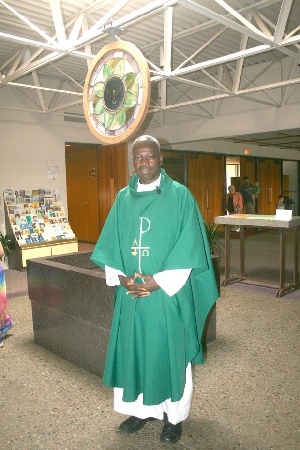Now in his second year of serving as assistant pastor of Church of the Holy Spirit in Plattsmouth, Rev. Fr. David Azambawu clearly realizes how different his adult life is from his childhood in Ghana.
Azambawu, now age 52, was born six years after the British rule officially ended in Ghana March 6, 1957. He credited Dr. Kwame Nkrumah for the break from the United Kingdom. “He studied here in America and when he got back he and five others led a fight for freedom,” Azambawu said.
“It was a peaceful transition. It started even before 1957, and the country gradually was weaned away.”
Of course, Azambawu as a young child wasn’t aware of the political changes in his country or his future in America as a priest. “I didn’t know what school was. Education was reserved for the few privileged such as the children of the local chief,” he explained. “Children of ordinary people were not educated.”
Instead of formal schooling, Azambawu, like many native Ghana boys, started life as a shepherd on his uncle’s farm.
“My dad worked for the government and moved from place to place, so he put me in the care of my uncle. You started leading sheep to pastures, and then graduated to herding cattle. As you became older and strong enough, you worked on the farm,” he said.
When he was nine years old Azambawu’s father bought a small farm in the village of Chiana, where the entire family could live and work together including his seven sisters and four brothers. Together, they began raising ground nuts or Bambara beans, chickpeas, guinea corn and some rice. Farming in a tropical climate had its dangers including venomous snakes.
“Life wasn’t easy. If you were lucky, you were given a handful of ground nuts in the morning. This was to do you from morning to sunset. While in the bush, we would eat wild fruits or sometimes we happened to kill a bandicoot, a big rat. Fortunately, I want to believe that God took care of me. My uncle and I went fishing in the night. God protected us,” he said.
The move to the farm, however, gave him the opportunity to start attending school in Tamale, a city in Ghana.
“I had English-speaking teachers,” he said.
At first, he preferred his life in the fields over school. “Having to sit and study is another dynamic,” Azambawu said. “But as I got educated, I realized what I was missing.”
His classes followed the British educational system with six years in the primary grades and four in elementary and middle. “If you qualified for the common entrance exam, you went to five years of high school. After five years, you had another two years, Form 6 and Form 7, equal to post high school,” he said. “If you qualify to go to the university, you chose a career.”
The young farm boy was astute in his studies and had long had an interest in the priesthood. “But when I started in high school, through peer influence, my interest went away. So after Form 6 and Form 7, I did national service and spent one year working.”
He worked one year before pursuing his priesthood at St. Victor’s Seminary in Tamale, where he spent the next seven years. He completed three years of philosophy and four years of theology. He also worked with priests for a year to complete his pastoral experience.
“Then I went back to the seminary where I was ordained a deacon. I studied theology and parish ministry and various sacraments,” Azambawu said.
At St. Victor’s he also trained as a “formator,” a trainer of priests. “I worked for eight years doing that in the seminary,” he said. “Then the bishop wanted me to come back to the diocese in Navrongo-Bolgatanga (in the upper east region of Ghana). Before I went back, I took a two-year sabbatical to renew myself. That’s why I came here.”
Azambawu already knew people in Nebraska. “I knew some people here and applied to the bishop. My bishop told Bishop James Connolly of the Lincoln Diocese and he accepted me here. After two years, I’ll go back home as a Dionysean priest. I’ll help my people.”
He’s already started by kickstarting the building of a medical clinic in Chiana with the help of Patrick Gress of Nebraska City. The nearest hospital is 15 miles away with walking, bicycling and motorcycling as the primary modes of transportation.
“So far, we’ve been able to put up the structure but it’s not all furnished yet. We took up collections this spring for supplies such as clothing and basic medical supplies. We got hospital beds from the old St. Mary’s Hospital,” Azambawu said.
Once up and running, the clinic will be able to help with snake bites, malaria, eye diseases, dysentery and basic hygiene practices. Many Ghanaians also suffer from spinal meningitis because of the hot weather.
He has enjoyed his time in Plattsmouth working with The Rev. Fr. Loris Grell. “It’s a beautiful place, a small place like my home. People are very nice. I’ve seen the gospel alive.”
When he’s not taking care of his duties as assistant pastor, Azambawu takes sabbatical history, Catholic education, history of the Catholic Church and European history classes at the St. Augustine Institute in Denver. The farm boy has evolved into a theological scholar.
“I surprise myself. I can only say, ‘God is good and nothing is beyond Him,’” he said.
Religion of Thursday, 10 September 2015
Source: fremonttribune.com















